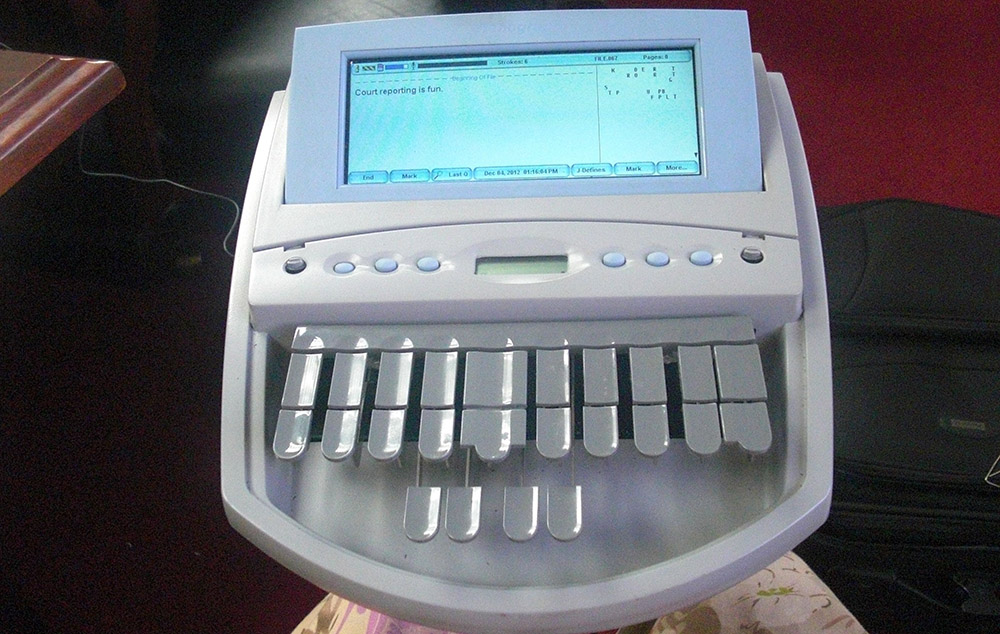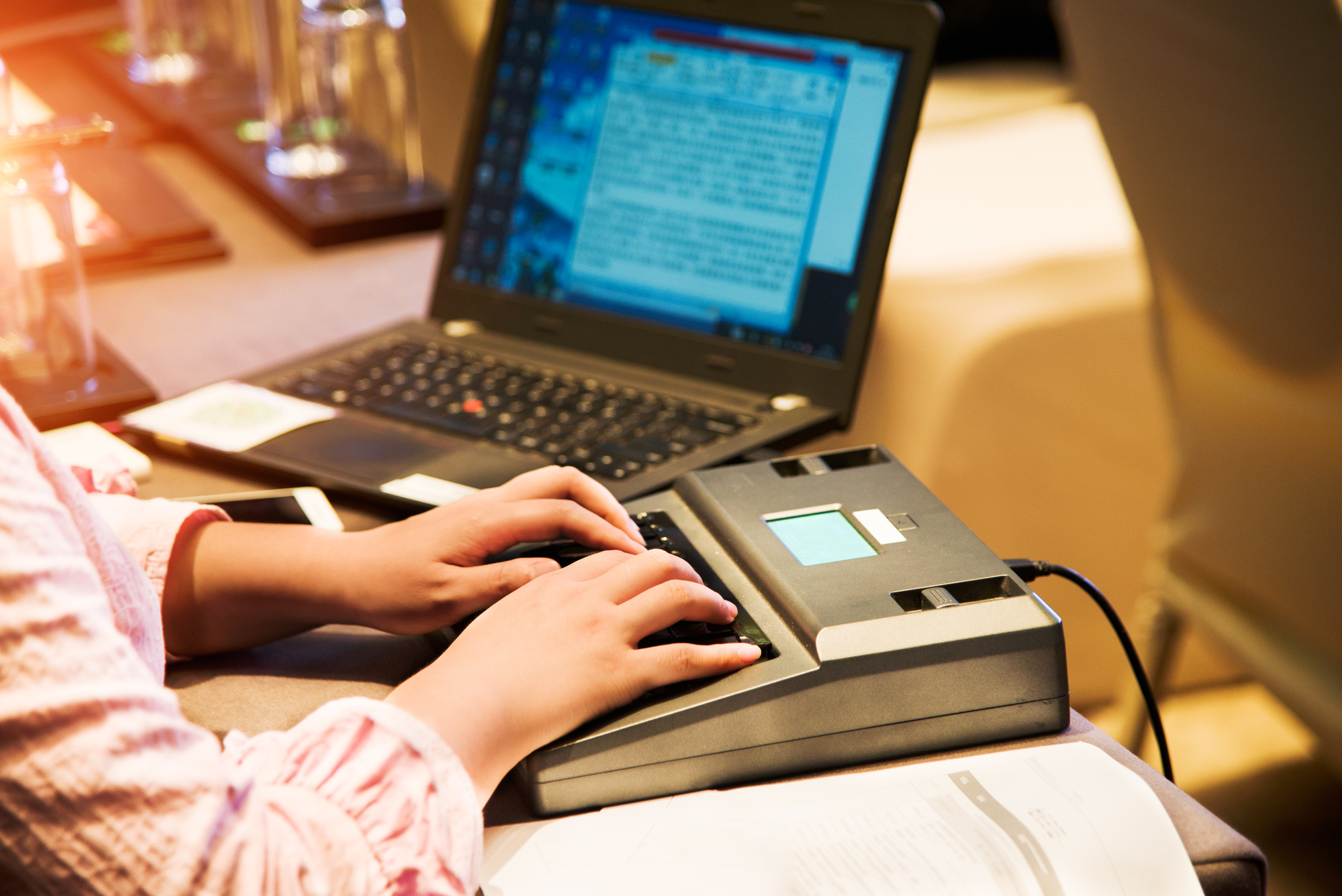Why Court Reporting Is Essential for Accurate Legal Documentation
Court coverage plays a crucial role in the legal system. It gives an exact, verbatim record of court procedures. This accuracy is crucial for keeping the integrity of lawful processes. Errors in documentation can cause considerable repercussions for case outcomes. As lawyers significantly depend on these transcripts, understanding the subtleties of court reporting ends up being needed. What aspects add to the performance of this technique in making sure justice?

The Duty of Court Reporters in the Legal System
Court press reporters offer as the crucial link in between spoken testimony and composed record in the lawful system. They are accountable for recording verbatim accounts of court proceedings, assuring that every word talked is properly transcribed. This transcription comes to be a main record, important for allures, legal research study, and keeping the honesty of judicial processes. Court press reporters make use of specialized tools and strategies, such as stenography, to promote this accurate documents. Their role expands past simple transcription; they need to recognize lawful terms and court room treatments to ensure clarity and context in their documents. Furthermore, court press reporters preserve confidentiality and impartiality, adding to the general fairness of the lawful procedure. Their job is essential for events, attorneys, and judges entailed in litigation, as it gives a reputable account of procedures that can be referenced in future legal actions. Via their competence, stenotype reporter promote the requirements of justice within the lawful system.
Guaranteeing Accuracy in Legal Records
Maintaining accuracy in lawful records is critical to the integrity of judicial proceedings. Stenotype reporter play a critical duty in catching every spoken word throughout tests, depositions, and various other legal setups. Their proficiency in stenography and familiarity with lawful terminology warranty that records reflect the precise discussion and subtleties of the situation. Any type of errors or noninclusions can result in false impressions, which may detrimentally impact the results of legal disagreements.
To accomplish this degree of accuracy, stenotype reporter use sophisticated modern technology and strenuous training to improve their transcription abilities. They likewise take part in comprehensive evaluation procedures, cross-checking their help precision prior to completing papers. In addition, assuring appropriate context and audio speaker identification includes one more layer of integrity to the transcripts. Inevitably, exact legal transcripts function as foundational files that support the justice system, making it possible for all parties entailed to rely upon an accurate record of process.
The Significance of Real-Time Reporting
Real-time reporting has actually arised as a significant improvement in the area of court reporting, improving the effectiveness and accessibility of lawful proceedings. This innovation permits court reporters to transcribe talked discussion instantly, giving prompt access to records for attorneys, courts, and various other lawful workers. With real-time reporting, participants can swiftly assess disagreements and statements, facilitating more educated decision-making during procedures.
In addition, this ability is particularly useful in intricate situations where quick understanding of info is necessary. It advertises more clear communication among all events, minimizing the possibility of misconceptions. In addition, real-time transcripts can be shared from another location, benefiting those unable to attend personally, thereby broadening access to justice. As legal environments come to be significantly vibrant, the duty of real-time reporting in guaranteeing accurate and timely information dissemination can not be overemphasized, making it an important tool in contemporary court reporting practices
Legal Documents and Its Influence On Case Outcomes
Reliable lawful paperwork plays a necessary function fit case end results, because it acts as the structure upon which lawful debates are built. Accurate documents guarantee that all pertinent truths, testimony, and evidence are clearly offered, permitting lawful experts Get More Information to build compelling cases. Inaccuracies or noninclusions in paperwork can result in false impressions, which might negatively influence the court's choice.
Moreover, efficient documentation helps with reliable case administration, enabling lawyers to quickly reference critical info throughout proceedings. Juries and juries count greatly on documented proof to comprehend the context and subtleties of a case. The quality of legal paperwork directly influences the reliability of debates provided in court.
Eventually, specific and extensive lawful documentation not only boosts the possibilities of positive outcomes but also upholds the integrity of the lawful procedure, guaranteeing that justice is served properly and fairly.
Advancements in Court Coverage Innovation

As technology remains to evolve, improvements in court coverage have substantially changed how legal documents is generated and handled. Developments such as real-time transcription software permit stenotype reporter to provide instantaneous accessibility to transcripts, enhancing the effectiveness of lawful procedures. Digital like it tape-recording systems have likewise emerged, providing a trustworthy backup to conventional approaches, while expert system is progressively being incorporated into the documentation procedure, enhancing precision and lowering human error.
In addition, cloud-based platforms facilitate protected sharing and storage of court records, making certain that lawful groups can access required files from anywhere. Remote court coverage has actually come to be commonplace, enabling lawful specialists to get involved in process no matter geographical area. These technological innovations not only enhance the court reporting procedure but also improve the general honesty of lawful documents. Therefore, the lawful area is much better geared up to meet the needs of contemporary lawsuits, making sure that justice is served successfully and properly.
Regularly Asked Questions
What Credentials Do Court Reporters Normally Need?
Stenotype reporter usually require a secondary school diploma, specialized training in court coverage, and efficiency in shorthand or voice writing. Accreditation and licensure needs differ by state, boosting their reputation and making certain specialist criteria are satisfied.
How Do Court Reporters Maintain Confidentiality?
Court press reporters maintain confidentiality by sticking to rigorous ethical guidelines, making use of safe and secure methods for storing and sending records, and making certain delicate information is shared just with certified individuals associated with the lawful procedures.
Can Court Reporters Job in Other Settings Besides Courts?
Court reporters can certainly operate in different settings beyond courts, consisting of depositions, organization conferences, and legal assemblies. Their skills in next recording talked language accurately make them valuable in any kind of atmosphere calling for precise paperwork.
What Is the Typical Wage of a Court Reporter?
The ordinary income of a stenotype reporter varies commonly, normally varying from $50,000 to $100,000 each year, depending on variables such as experience, area, and the details industry in which they are used. (durham court reporting)
How much time Does It Take to End Up Being a Licensed Stenotype Reporter?

Court press reporters offer as the essential web link in between talked testimony and created record in the legal system. In addition, court press reporters preserve confidentiality and impartiality, contributing to the general justness of the lawful procedure. Advancements such as real-time transcription software allow court press reporters to deliver immediate access to transcripts, enhancing the effectiveness of lawful proceedings. Court reporters generally need a high college diploma, specialized training in court reporting, and proficiency in shorthand or voice writing. Court press reporters can certainly work in different settings beyond courts, consisting of depositions, service meetings, and legislative settings up.